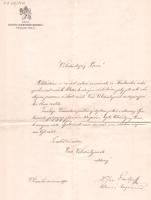Hórnik, Michał – Materials from Personal Inheritance
Michał Hórnik (September 1, 1833, Worklecy – February 22, 1894, Bautzen; Ger. Michael Hornig) was a Sorbian national revivalist, linguist, translator, journalist, poet and Catholic priest. Having completed basic education in his native Worklecy (Ger. Räckelwitz), he began to study at a grammar school in Bautzen in 1846. After one year, he left for Prague, where he attended a German grammar school. Once he passed his school-leaving examination, he decided to study theology and Slavic studies at Charles-Ferdinand University. In 1856, he was ordained a priest and he worked as a Catholic priest in Bautzen. Fifteen years later, he became a parish priest at the Church of the Virgin Mary. Towards the end of his life, he was appointed titular canon in 1889 and scholastic canon of the Bautzen Chapter in 1891. He died after a stroke 1894.
Besides the undeniable influence of the German milieu, one can notice Michał Hórnik’s close relation to the Polish language and national revival, probably based on his Polish roots, as well as to the Czech national revival and the Czech language. Already during his studies at a German grammar school, he became a member and later also the chairman of the student association “Serbowka”, in whose magazine he published his first literary works and poems. Having become a university student, he began to publish scholarly articles as well. The first of such treatises came out in 1855 in the Journal Časopis Maćicy Serbskeje under the title “Hdźe mamy ó pisać?”. This was followed by numerous works on linguistics, in which Hórnik tried to codify and unify Sorbian spelling, to bring Upper and Lower Lusatian dialects closer to each other, to introduce the Latin alphabet and to remove Germanisms.
Hórnik was the founder of several periodicals issued in Sorbian, e.g. Serbske Noviny [Sorbian Newspaper], Łužičan [The Lusatian] or Katolski Posoł [Catholic Herald]. In 1882, he was appointed the chairman of Maćica Serbska. To gain a deeper knowledge of the language, he devoted himself to collecting folk songs, fairy tales and other literary works. Although he did not complete his efforts to create a proper Sorbian grammar, the results of his endeavours became a source for other researchers, who continued his work. He contributed to both Sorbian and foreign, mainly Slavic, periodicals. It is further necessary to mention Hórnik’s cooperation with other important researchers. For instance Historija serbskeho naroda [The History of the Sorbs], the co-author of which was the Polish historian Wilhelm Józef Bogusławski, was published in 1884. Hórnik also contributed to Pfuhl’s Sorbian dictionary (Serbski słownik came out in 1865, Łužiski serbski słownik in 1866). A translation of the New Testament, in which he had been assisted by the Catholic priest Jurij Łusčanski, was published two years after Hórnik’s death. Apart from professional work, Hórnik also supported the publication of fiction and religious books and published a number of articles at his own cost.
The collection of Michal Hórnik, deposited in the Slavonic Library, contains documents from 1845–1894. These comprise mainly correspondence, in particular with national revivalists in other Slavic lands, mostly from Bohemia and Moravia, then from Sorbia and less from Poland. The authors of the letters include many significant names: besides Karel Jaromír Erben and Václav Hanka also Antonín Cyril Stojan, a later archbishop of Olomouc, and the historian Augustin Sedláček. Moreover, the collection contains materials from Hórnik’s literary estate, especially drafts of letters, literary attempts, poetry, articles, newspaper clippings, drawings, notes etc. A specialty is a Christmas Eve wafer placed in one of the Polish letters.
Further archival materials can be found mainly in the Sorbian Cultural Archives in Bautzen (Serbski kulturny archiw/Sorbisches Kulturarchiv).
